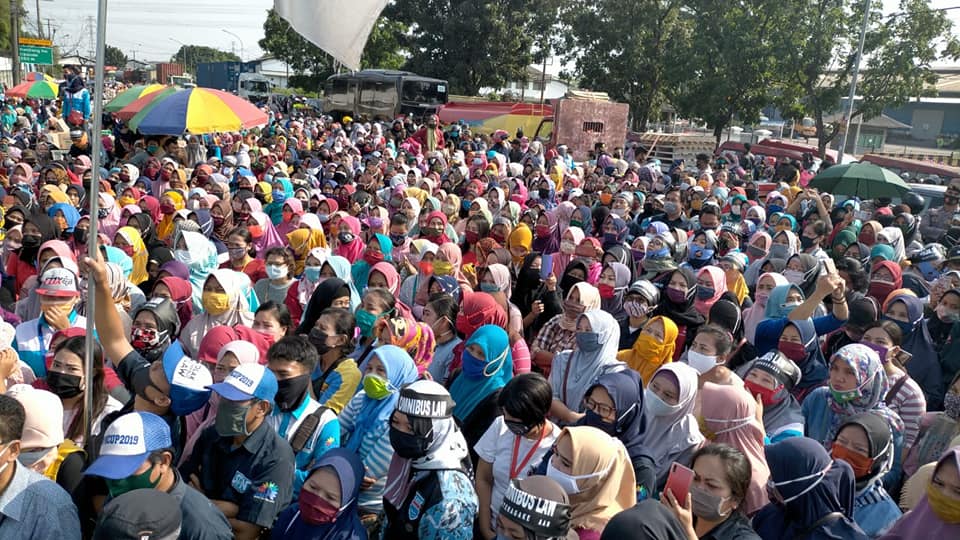Reality of Aid Statement on the IMF-WBG Annual Meetings 2021
November 2021
The Covid-19 pandemic has created the deepest economic crash in recent history highlighting the critical role of development finance now more than ever. With Official Development Assistance (ODA) underperforming in recent years, developing countries are in desperate need for financing to boost their domestic budgets and contain the pandemic.In response, the World Bank Group has provided its biggest loan commitments in history. But a closer look at the nature of these loans and the conditionalities that come with it reveal the Bank’s underhanded neoliberal agenda – an agenda aligned with the promotion of private sector solutions at the expense of people’s rights and the environment.
The Bank has committed over $157 billion to ‘Covid response’ from April 2020 to June 2021 through its various lending instruments including Development Policy Loans (DPLs) which constituted 27 percent of total loans in 2021. A recent report from Eurodadfound that policy reforms instituted through DPLs increasingly targeted tighter fiscal spending, often in alignment with pre-existing IMF loans, including in some cases through cuts in public wages and health spending for medicine. The report further argues that majority of prior actions[1] were aimed at promoting business support and private sector development including tax relief for businesses.[2]
The World Bank missed the mark when it comes to supporting national governments in their efforts to contain the spread of Covid-19. In the Philippines for example out of the 28 total DPL prior actions, only 6 were explicitly designed to incentivize Covid response such as unemployment subsidies, support for MSMEs and other social amelioration programs. More worryingly, majority of prior actions in this period were focused on ensuring the implementation of the much-criticized Rice Tariffication Law which pushed millions of small-scale farmers to poverty by allowing cheap imported rice to flood the domestic agricultural market.[3]
Further, loans in the same period failed to incorporate green recovery in the energy sector while also reinforcing rollbacks in labor rights and environmental protection. In Indonesia, the Omnibus Law on job creation, which was lauded by the World Bank in its now-defunct Doing Business Report and is promoted in its various loan documents, practically erased decades of labor protection policies (including shortening maternity leaves for women) and relaxed environmental protection standards to attract private investments, arousing criticism from unions, NGOs and even investors. The said law further incentivized extractive industries by waiving royalty fees as long as they develop down-stream facilities including coal-fired power plants.[4]
Meanwhile, two so-called “sustainable development and green growth DPFs” in Colombia, allowed for fracking and deep-water drilling to qualify for tax breaks. Another DPF, while specifying adoption of carbon tax, also introduced tax reforms lowering the corporate income tax rate and raising the VAT rate – favoring oil and gas firms in the process.[5]
On top of the staggering external debt in countries of the global South, IMF conditionalities promoting austerity have been included in a large majority of loans in 2020. According to a study by Oxfam, fiscal consolidation measures were promoted in 84% of the loans made from March to December 2020, across 67 countries.[6] This has serious consequences for spending on the health sector and social protection, with Ecuador, for example, being advised to cut down on cash transfers. Other countries, including Afghanistan, Nigeria, and São Tomé and Príncipe, are being asked to ramp up their collection of Value Added Tax (VAT), while others including Tunisia, Barbados and Lesotho, are forced by loan conditionalities to cut wage bills. This new wave of austerity is expected to negatively impact mainly low-income households, among them women, children, and the elderly.[7]
Indeed, the Bank’s current approach to development financing runs counter to their established mandate of ending extreme poverty and aligning with the Paris Agreement. Its top-down and private sector-oriented approach to development has only led to increasing poverty and inequality, rising historic debts, and bigger investments in fossil fuel development. Deep structural reforms are needed to ensure all forms of development financing are aligned with sustainable development objectives. The Reality of Aid Network calls on the World Bank to:
1) End policy conditionalities that prioritize private sector solutions and instead focus on incentivizing Covid-19 response includingsocial development-focused reforms.
2) Ensure democratic ownership of development results by expanding spaces for meaningful consultations with a wide range of stakeholders including civil society organizations in shaping policy reforms at the domestic level.
3) Be held accountable for the impacts of its loan conditionalities on human rights and the environment among borrowing countries. This includes, among others the regular release of the World Bank Development Policy Financing Retrospective as one of the means to ensure proper monitoring and evaluation of DPF loans aligned with sustainable development objectives.
4) End the aggressive promotion of DPF loans that directly or indirectly fund fossil fuel development.
5) Put human rights at the center of the design, implementation and assessment of development financing instruments.
[1]Prior Actions are conditions set by the World Bank which must be met by borrowing countries before loan approval and disbursement.
[2]https://d3n8a8pro7vhmx.cloudfront.net/eurodad/pages/2551/attachments/original/1632903437/dpf-report-final.pdf?1632903437
[3]Reality of Aid (2021). Policy Conditionality in the 21st Century: A close look at development policy financing in the Philippines and Indonesia.
[6] https://www.oxfam.org/en/blogs/virus-austerity-covid-19-spending-accountability-and-recovery-measures-agreed-between-imf-and
[7] Ibid.

